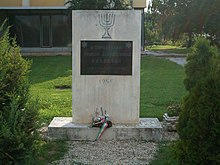
The Kunmadaras pogrom was an anti-Semitic pogrom that took place shortly after the Second World War in Kunmadaras, Hungary. The pogrom took place on 22 May 1946. According to the Jewish Telegraphic Agency, three Jews were killed and up to 20 were injured.[1]
The riot began in the marketplace as a spontaneous protest against a suspected profiteer. Since the traditional occupation of the Jews in the area was trade, the image of a profiteer was conflated with that of a Jew. Thus the riot grew into an anti-Jewish pogrom. The frenzy was further instigated by the rumors that the Jews were stealing Christian children. The historian Péter Apor made a peculiar observation about the subsequent trial of the pogromists: "The People's Tribunal managed to produce a narrative of an anti-Semitic pogrom without involving the Jewish victims." The pogrom was portrayed as a resurgence of fascism pitched against the nascent people's democracy.[2]
On 26 July 1946, ten rioters were convicted of having instigated and participated in the violence. Three were sentenced to death. Two others were sentenced to 15-years in prison with hard labor each, and had their property confiscated. A police officer who was involved received a 6-year sentence, while four youths were sentenced to reform schools. Several other defendants were acquitted.[3][4]
See also[edit]
References[edit]
- ^ "Report of Miskolc Outbreak Says Fascist Mob Utilized Workers Protest Against Profiteers". Jewish Telegraphic Agency. 5 August 1946.
- ^ Apor, Péter (2013). "The Lost Deportations and the Lost People of Kunmadaras: A Pogrom in Hungary, 1946". Hungarian Historical Review. 2 (3): 566–604.
- ^ Kamins, Toni (17 November 1946). "Nine Convicted of Participation in Kunmadaras Pogrom Appeal to Higher Court". Jewish Telegraphic Agency. Retrieved 2020-01-06.
- ^ "Three Sentenced to Death for Instigating Kunmadaras Pogrom; Three Others Get Life". Jewish Telegraphic Agency. 2015-03-20. Retrieved 2023-11-26.
- Hidas, Peter I. "Canada and the Hungarian Jewish Refugees 1956-1957". John Carroll University, AHEA Conference, 9-11 April 1999. Sympatico. Archived from the original on 3 March 2016. Retrieved 14 October 2008.
Further reading[edit]
- Braham, Randolph L; Chamberlin, Brewster S (2004). Holocaust in Hungary: Sixty Years Later. Rosenthal Institute for Holocaust Studies, Graduate Center of the City University of New York. pp. 167, 189. ISBN 0-88033-576-9.